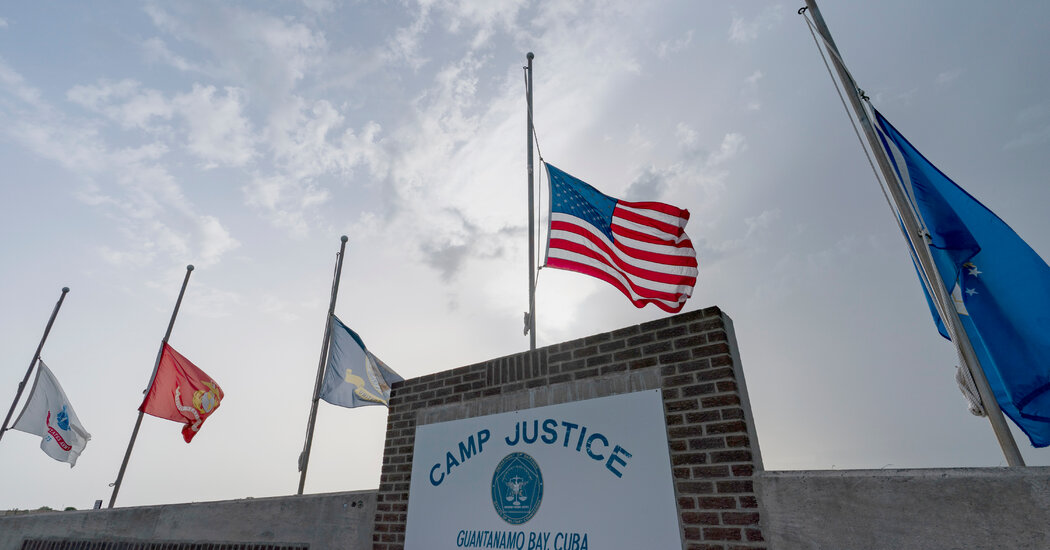
GUANTÁNAMO BAY, Cuba — Translation and interpretation problems on Monday delayed by one day military efforts to formally charge three Southeast Asian men — held by the United States for 18 years — with conspiring in deadly terrorist bombings in Indonesia in 2002 and 2003.
Prosecutors accuse the three prisoners — Encep Nurjaman, who is known as Hambali; Mohammed Nazir Bin Lep; and Mohammed Farik Bin Amin — of murder, terrorism and conspiracy in the 2002 nightclub bombings in Bali, which killed 202 people, and the 2003 Marriott hotel bombing in Jakarta, which killed at least 11 people and wounded at least 80.
Defense lawyers have called them torture victims who spent about three years in the secret C.I.A. prison network where agents used waterboarding, sleep deprivation, beatings, painful shackling and other now outlawed “enhanced interrogation” techniques to extract information from their captives.
In 2003, a C.I.A. interrogator told Mr. Hambali that he would never go to court, because “we can never let the world know what I have done to you,” according to a study of the C.I.A. program that was released by the Senate Intelligence Committee in December 2014.
Monday’s formal charging was meant to be a crossroads of sorts, the start of proceedings in a case that was approved by a Trump administration appointee on Jan. 21, the first full day of President Biden’s administration — and postponed by six months by pandemic restrictions.
The proceedings ended up being the latest example of the delays that have plagued Guantánamo’s justice system nearly 20 years after it was chosen to hold detainees captured after the Sept. 11 attacks and in the global effort to track down terrorists.
All three men have been in the custody of the United States since 2003, and have been held at Guantánamo as members of Jemaah Islamiyah, a Southeast Asian extremist group. Mr. Hambali, who is Indonesian, is accused of allying himself with Osama bin Laden’s global jihad, and sending Mr. Bin Amin and Mr. Bin Lep, former architecture students who met in college in Malaysia, to train in Qaeda camps in Afghanistan.
Translation and technical issues were evident at the outset. One lawyer pointed out that a prisoner had mentioned “Google” in a remark in Malay for the judge, but the court interpreter did not mention the search engine in an English translation. The Indonesian translator turned “legal training” in English into “training legal” in Bahasa Indonesian.
Defense lawyers said with alarm that all three defendants recognized a “Mr. Singh,” a translator with whom they each had confidential conversations as they prepared to seek release through a review board hearing, sitting beside the lead prosecutor in court on Monday, now working for the prosecution.
Lawyers for the three prisoners also told the judge that the court’s official Indonesian translator had in 2020 offered the opinion that “the government is wasting money on these terrorists; they should have been killed a long time ago,” and added that they had a sworn affidavit from a witness who heard the remark. Prosecutors are seeking life sentences in the case.
Mr. Bin Lep’s lawyer, Brian Bouffard, declared the Indonesian American contract translator “irretrievably biased.” Mr. Bin Amin’s lawyer, Christine Funk, questioned why the prosecutors needed an interpreter at the arraignment hearing in the first place: “Are they spying on us? I don’t know.”
The trial judge, Navy Cmdr. Hayes C. Larsen, tried to mend the problems. He gave the official court translation team 10-minute breaks every 20 minutes. He told defense lawyers to file legal motions if they believed there were interpretation problems that required remedies. And he postponed until Tuesday the reading of the charges, which was the reason for Monday’s hearing.
Defense lawyers, both civilian and military, and all paid by the Pentagon, described the case as still in its infancy. Prosecutors, they said, had provided perhaps 2 percent of the pretrial documents that could be used in the case, including accounts of interrogations the F.B.I. did in 2007 with the prisoners soon after their transfer to military custody from the C.I.A. Prosecutors declined to comment.
Mr. Hambali’s lawyer, James R. Hodes, called the case “absurd,” in part because of the length of his client’s detention and the nearly two-decade delay in bringing charges against him. He told reporters before the hearing that Mr. Hambali had been “brutalized” and spent at least half of his detention in solitary confinement. He said the prisoner was owed “an apology” and repatriation, “not to be held in a cage in a Caribbean island.”
Hearings at Guantánamo have been mostly held between English and Arabic, but have also suffered translation problems. In 2015, one of the men accused of plotting the Sept. 11 attacks blurted out the name of a translator in court — and disclosed that the linguist had previously worked for the C.I.A. at a black site, exposing his identity and derailing a week of hearings.
Finding U.S. translators with top-secret security clearances who speak Southeast Asian languages has apparently proved even more of a challenge. The Senate study of the C.I.A.’s interrogation program cited a January 2004 cable from a secret detention site that reported that Mr. Bin Lep’s “English is very poor, and we do not have a Malay linguist.”



